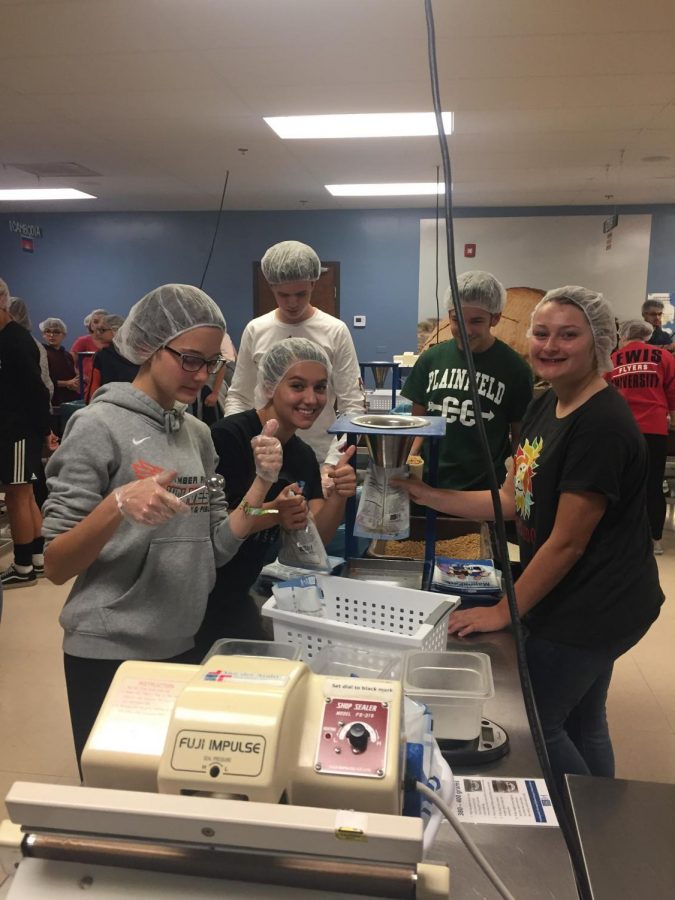Mandatory volunteering helps everyone
 Mandatory volunteer hours are a requirement to be a part of several organizations such as National Honor Society (NHS), Wildcat Athletic Leadership Club (WALC), and Key Club. The idea behind having mandatory volunteer hours is to benefit the community and the students who take part in the organizations, and they succeed.
Mandatory volunteer hours are a requirement to be a part of several organizations such as National Honor Society (NHS), Wildcat Athletic Leadership Club (WALC), and Key Club. The idea behind having mandatory volunteer hours is to benefit the community and the students who take part in the organizations, and they succeed.
Cleaning up garbage, volunteering at Feed My Starving Children, and feeding the homeless have a positive impact no matter in what light one looks at it. Serving the community and the school is necessary; if students do not do it, who will?
NHS requires thirty hours of volunteering total, 10 hours of school service, 10 hours of community service and 10 choice hours. A part time job is considered working 34 hours a week, four more hours than the required number for an entire year. Thirty hours for an entire year is attainable. If students are invited to be in NHS or WALC and they do not take the opportunity, they are missing out on something to enhance a college resume and a chance to help the community. Students who refuse to volunteer are not only lazy, but they are self-centered.
Volunteering allows students to gain leadership skills as well as open up doors for future careers. Volunteering at parks could lead to an interest in local government, or after volunteering for an animal shelter a student might realize their passion for veterinarian care. Mandatory volunteer hours lead to more life experiences which could make choosing a college major significantly easier. Volunteering can also open students’ eyes to the needs of the community, and cause students to be more responsible and accountable.
In the era where climate change is the primary issue, cleaning up garbage and doing their part is better for the community. Mandatory volunteer hours are pushing students to help their community, so how is that a problem?
Colleges and jobs like to see that their applicants are involved in the community. Mandatory volunteer hours are doing nothing but helping the community and the students who are working for it. In fact, volunteer hours should be mandatory for graduation to benefit the community and the students’ character.
Making volunteering mandatory defeats the purpose
 Required volunteer hours are a large part of the academic process, whether they’re for a scholarship, college application, or even an organization such as the National Honor Society (NHS).
Required volunteer hours are a large part of the academic process, whether they’re for a scholarship, college application, or even an organization such as the National Honor Society (NHS).
However, the phrase “required volunteer” is a complete oxymoron.
Volunteering, by definition, is voluntary. As soon as it is mandatory, students are just working for no pay.
When the goal of volunteering is for something like qualifying for a scholarship or getting into a school, it almost seems disingenuous. It is for personal gain rather than out of a desire to better the world around them.
Colleges and similar establishments encouraging prospective students so heavily to volunteer makes it nearly impossible to determine the intentions of those students when they do.
This strong encouragement leads to what I’ll call a “pseudo-minimum.” While no real hour requirement exists, it is implied that if one wants to be accepted to some colleges, they need volunteer hours.
If a college wants their students to be upstanding citizens and subsequently enacts a pseudo-minimum number of volunteer hours, they won’t be effectively weeding out the less charitably enthusiastic, instead only the less willing to attend that college.
Perhaps that is the goal, though unlikely, that the universities use volunteer work just as a test to see who wants to attend them most, but chances are that they simply want to recruit students who are proactive in assisting others.
Now, this is not dismissing volunteering as unnecessary; I encourage anyone who truly wants to help their community to do so. Still, the all-too-common practice of holding students to a standard like that is not the right way to approach it.
Since the heart of this issue lies in the difference between authentic and forced volunteering, the easiest solution is that schools should be doing everything in their power to facilitate authentic volunteer sessions.
That could be done by organizing opportunities more frequently and decreasing incentives. If students already know heading into it that the “prize” at the end is self-betterment and improving the community instead of qualifying for a scholar-ship or fulfilling an NHS require-ment, then it benefits both them and the colleges.
